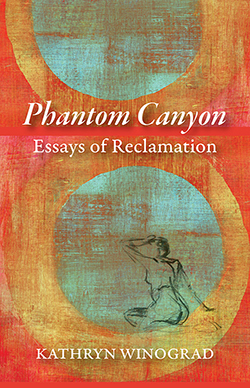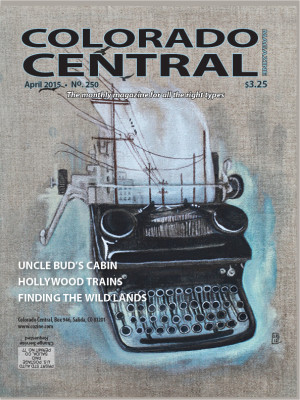Phantom Canyon: Essays of Reclamation
By Kathryn Winograd
Conundrum Press, 2014, paper, 148 pp, $12.99
Reviewed by Annie Dawid
Phantom Canyon, a rough and rustic valley in the Front Range, inspires Colorado essayist and poet Kathryn Winograd to write visceral essays that both wound and heal. Rich with mining history and the detritus of a formerly prosperous life, the area surrounding Phantom Canyon, including the once-gilded Victor, acts as muse for Winograd’s recent collection, subtitled “Essays of Reclamation,” containing 23 lyrical prose pieces. The collection informs readers about this storied sector of Central Colorado, mining Winograd’s personal history as it simultaneously plumbs the depths of damage perpetrated by men on the natural world, subsuming the female body, including Winograd’s 13-year-old self.
Born in the Midwest, Winograd migrated to Colorado in the 1980s, where she married her Denver-born husband, Leonard, who appears as a kind of skeptical counterpoint to the author, punctuating various essays with his urban, sometimes cynical wit. A graduate of the University of Denver’s PhD program in Literature/Creative Writing, Winograd now directs the Writers Studio at Arapahoe Community College, where she has taught for the last decade. When she and Leonard bought land in Teller County on which to construct a weekend cabin, her writing veered to prose from her former province of poetry, melding the best of both worlds in the form of the lyric essay. Her first book, Air into Breath (Ashland Poetry Press), won the 2002 Colorado Book Award. Most of the pieces in Phantom Canyon have won prizes and appeared in literary reviews. “Bathing,” a painful, purging short piece near end of the collection, was named a notable essay in Best American Essays 2011 and is included, with another work by Winograd, (Note to Self): The Lyric Essay, in the sixth edition of The Fourth Genre: Contemporary Writers of Creative Nonfiction.
 In the introductory essay, “Dark Skies,” Winograd invites the reader to enter the sometimes frightening nighttime landscape of her high altitude refuge, her retreat from the blinding suburbs. “Darkness is overwhelming, immense, a black shroud between the world and me. What do we miss in a place of no real night, a place of misdirected streetlights, of scattering aerosols, of sign illuminations, and diurnal moths battering at our lighted windows?”
In the introductory essay, “Dark Skies,” Winograd invites the reader to enter the sometimes frightening nighttime landscape of her high altitude refuge, her retreat from the blinding suburbs. “Darkness is overwhelming, immense, a black shroud between the world and me. What do we miss in a place of no real night, a place of misdirected streetlights, of scattering aerosols, of sign illuminations, and diurnal moths battering at our lighted windows?”
In the course of these lyrical prose pieces, we will learn what we miss while also entering Winograd’s past, unfurling along with the pages as the reader, along with the writer, acknowledges and integrates the rape by a stranger young Winograd experienced in Ohio, during an era of silent shaming. In the author’s hearing, a female classmate asks another, “Why would anyone want to rape her?”
Reading this today, we wince, pained and awed that Winograd survived such treatment to create out of the unholy horror a miraculous beauty, everywhere evident in Phantom Canyon, rending the self in “Heresies of the Holy.”
Here Winograd meditates on the death by suicide of a former classmate at the Iowa Writers’ Workshop:
Even here, in this place I think holy, my neighbors fence their land and warn me of prosecution for my trespasses. I stumble over scat and elk droppings, and the long bones of steers. I have no God. I am no man nor Thoreau nor Emerson. I am an aging woman, like this woman poet I once knew, a half-menopausal woman in a field full of dull barbed wire, where desperate cattle trample down the muddy leaks of a spring to drink in the drought of this winter, and where micro bursts of wind slay whole stands of trees, and people I do not know throw their trash and mattress springs into these glory holes I love.
Winograd acknowledges the whole of Nature as well as our human natures, the damage and the wonder, ever present. “And then an elk bugles and five appear over the ridge, stand listening to me. Then a river of elk – fifty, seventy – pound across the clearing, disappear into the trees, the bull elk left standing, bugling back to my small high blasts, wild along the stone ridges.”
Like Winograd, we find ourselves amazed, stunned by what we have witnessed. Like the elk, we can only marvel at the sound of that woman, whose voice elicits our tender, naked selves, leaving us feeling privileged to have heard it.




